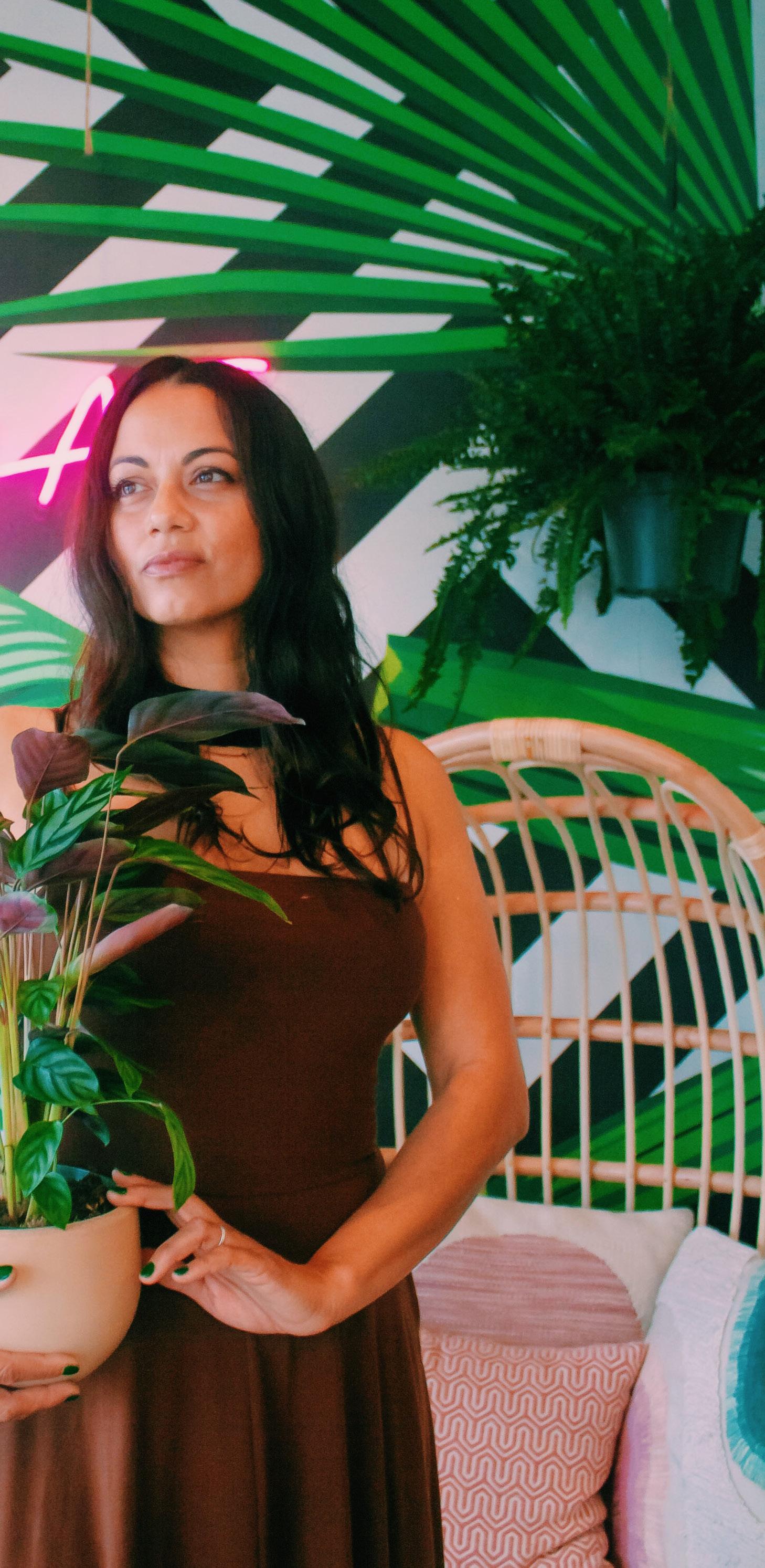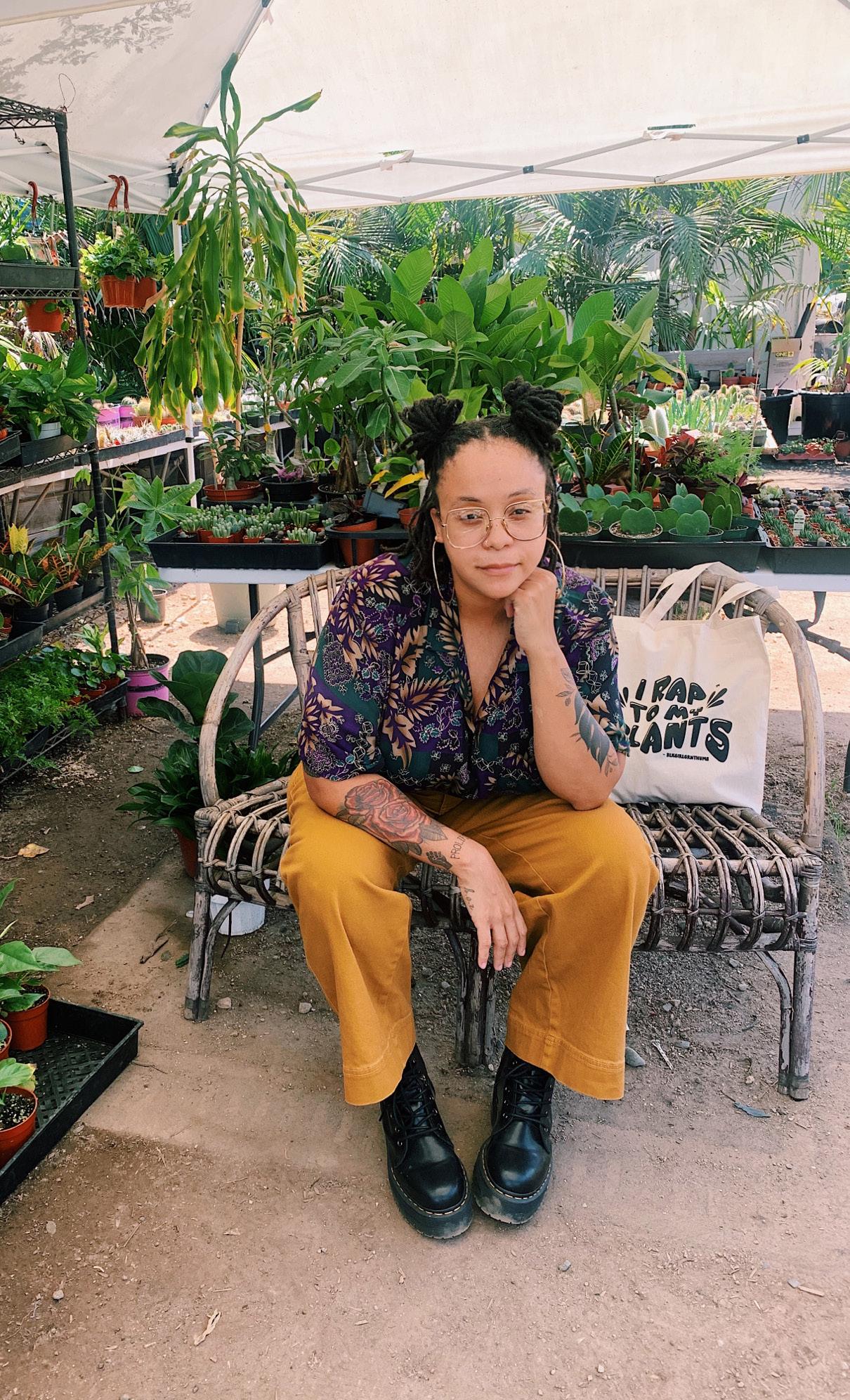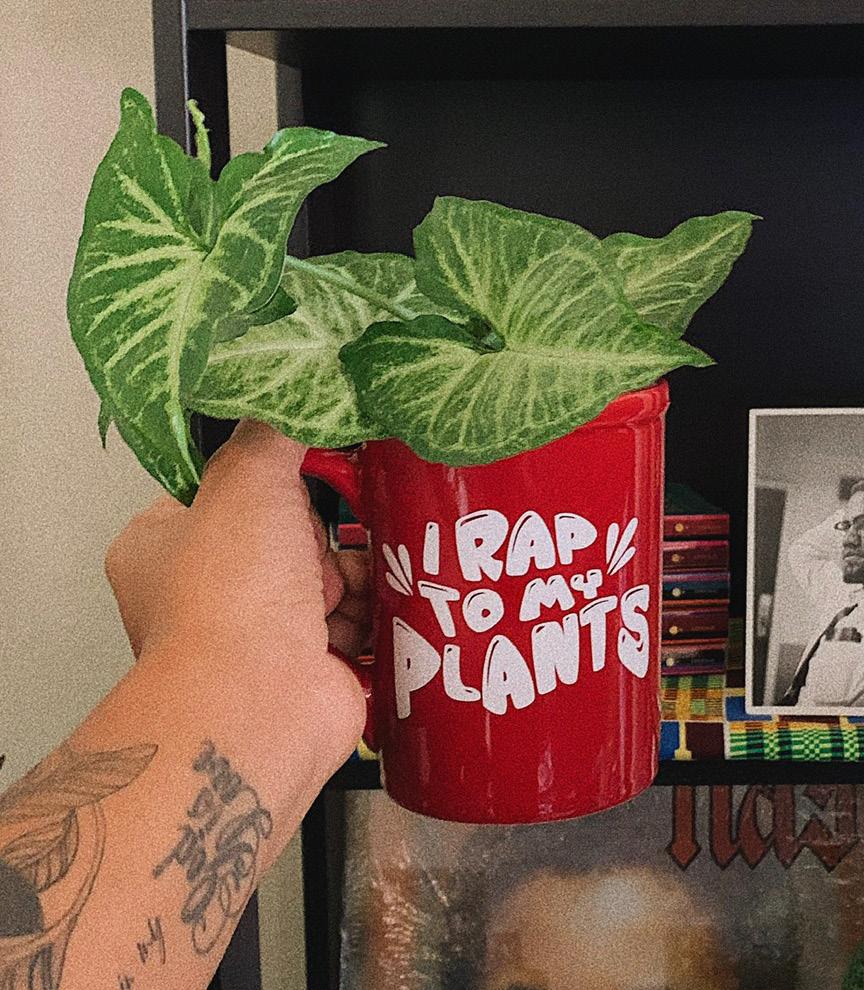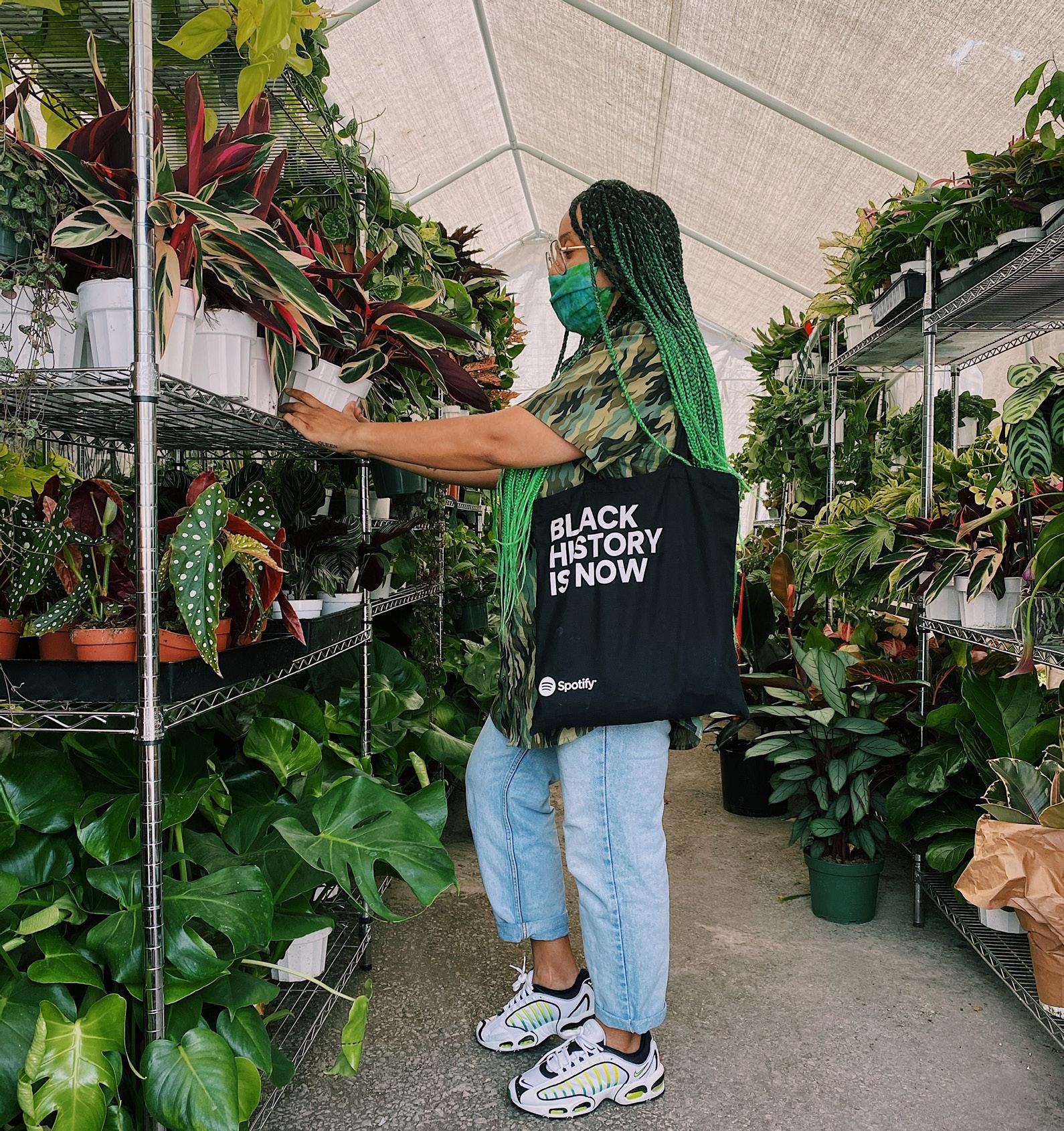
7 minute read
The Bloom Boom
from DIG MAG Summer 2021
by DIG MAG LB
STORY BY ERIKA PAZ
The power of plants. It’s teaching us self care, self expression, and most importantly, a sense of community.
Advertisement
The bloom boom is officially in full flower in Long Beach.
It’s been growing for a few years now, but it truly went viral during the pandemic. Along with roller skating and sourdough bread baking, plant parenting became an oasis for many who were stuck at home.
But for people of color and the queer community, the plant trend is providing more than just a hobby, it has become an invitation for self care, selfexpression and important conversations.
In less than six months, Long Beach has seen the opening of two POC, queer-owned plant shops; Plantiitas, by owners Kevin Alcaraz and Anthony Diaz, who opened their store in October 2020; Pippi + Lola, opened in February 2021 by Dynelly Del Valle; and most recently, another shop in Bixby Knolls, Plants By Yours Truly, owned by Melissa Murillo. All three join the already thriving plant community in Long Beach.
“So many people come in and they start chit chatting with us. It starts off as, ‘I’m not very good with plants, but…’ and then all of a sudden we’re talking about trans rights. It gets really deep, real quick,” Del Valle said.
Pippi + Lola officially opened on Valentine’s Day. Del Valle, who describes herself as forever 25 and Puerto Rican by blood, is happy that her plant studio
u Pippi + Lola owners Melissa Balam, left, and Dynelly de Valle open their doors on Feb. 14, 2021 in Long Beach. Photo by Emily Chen Dynelly Del Valle, owner of Pippi + Lola, has curated an enviorment that is more than just a plant shop, it’s a plant oasis.

is providing a safe space for her fellow LGBTQ+ and POC communities. To her, plants are much more than house decor.
“I feel like the reason why a lot of people have gotten interested in plants during this pandemic is because it’s an avenue to self care. It’s a little therapeutic, it’s how you dedicate time to yourself and your plants,” Del Valle said. “Are they getting enough water? Are they getting enough nutrients? Are they getting enough sunlight? Those are all things that we do for our own bodies.”
Gardening and plant care as a way to live a better life is not news. Sure, plants help clean the air in your home and make your home look inviting, but research also shows that plants help reduce anxiety, help with depression, and improve concentration and productivity. You don’t need to spend all day in your garden, either. A study published by the Sichuan Agricultural University in 2018 showed that contact with plants for as little as 15 minutes is enough to reduce blood pressure, promote relaxation and lower anxiety.
So if plant care as self care is not a new concept, why did it take this long to see some diversity in the plant community?
Courtney Warwick, 36, who has been a Long Beach resident for 17 years, found herself becoming a plantfuencer—that’s a plant influencer, for the uninitiated— shortly after she discovered her love for plants.
Before the pandemic, plants had never interested Warwick. She had received a spider plant as a gift years before, but the plant died and her interest in plants never grew. Plants weren’t popular with her friends either. They just weren’t a part of her life.
But when the stay-at-home order took effect, she spent a week at her parents’ home, and her love for plants first sparked.
“My mom has this window in her house and she kept all these plants there...And I just, it never drew me in like that. But literally, that week I was looking at them and I was like, ‘I really want some plants now.’ It was so random,” Warwick said. “As soon as I left her house, I went to Trader Joe’s and bought a rubber plant and a palm.”

Plantfluencer Courtney Warwick’s advice for anyone wanting to start something new: “Everybody has their own path, everybody has their own journey. You let your plants grow, let your ideas grow too.” Photos courtesy of Courtney Warwick
Her plant collection quickly grew, so she decided to start an Instagram page. Her sister, Lauren Levi, helped her come up with her Instagram name, @blkgirlgrnthumb.
“I felt like [the account] took off pretty quickly. But I think what really made it hit is when the unfortunate death of George Floyd happened,” Warwick said. “It just ended up being hundreds of Caucasian supporters supporting people of color. And literally overnight, no lie, I got like 2,000 followers.”
The months after George Floyd’s murder led to an influx of support for Black creatives. Hashtags like #supportblackownedbusinesses and #blacklivesmatter started trending on all social media platforms, giving a renewed exposure to the online Black community. The support was so great, that it changed how much Black creators earn through social media.
IZEA Worldwide, an influencer marketing company, published their State of Influencer Equality report in January of this year. The report looks at data for the last five years and it focuses on influencer earnings by race, gender, age and language. In 2015, Black influencers were paid on average $129 per post. In 2020, the average was $1,773. According to the report, Black influencers, compared to white, Hispanic, Asian and other nonwhite influencers, earned the most per post in 2020 for the first time. Ever.

The rise in popularity of Black influencers meant that more people of color were able to find people they could relate to sharing interests that they had never considered before.
“I actually started the page to seek out people like me,” Warwick said. “I only started watching [plant] videos when I found someone like me. When I came across Hilton Carter.”
Hilton Carter is an artist, filmmaker, stylist and a plant daddy. He is known as The Plant Doctor on YouTube, and was one of the few non-white plant parents who was popular before 2020.
“When I found him and saw he makes videos, I was like, ‘Tight!’ This is what I needed,” Warwick said.
Her whole life, Warwick has always looked for relatability in her interests, including the he shows that she watches, the books that she reads, the stores where she shops. So when she found Carter, she found a way to relate her experience with the plant community.
That relatability has driven her online growth and her side hustle. As Warwick’s following grew, so did her ideas for @blkgirlgrnthumb. Her other interests have naturally made their way into her plant page. Photos of some of her favorite artists like, Tupac Shakur, Kendrick Lamar and Nipsey Hussle, regularly make background appearances on her feed.
Her signature slogan, “I Rap To My Plants,” has become the centerpiece of her merchandise. The merchandise has made its way into plant shops across the country, including her local Long Beach plant shop, Plantiitas.
As the Long Beach queer and POC plant community grows online and IRL, so has its impact on those involved.
“I’m grateful for finding my love for plants because I feel like it has helped me grow as a person. That’s something that I was lacking,” Warwick said. “You know when you’re lacking something or when you’re missing something? And literally since then, I’ve been good.”
She continued.
“I want to show that [plants are] self care for me. This is what I do, This is what I like to do. My end goal is to open a mobile plant shop. I don’t know how the hell I’m going to do it, but that’s something I really, really, really want to do.”

Del Valle, focusing on the intersectionality between plants, self care, safe space and equity, wants to continue having these important conversations.
“The issues have never not been there, It’s just that it’s been in the dark. People have only been able to talk about it among each other. And now we have voices and platforms that we can speak out to everyone,” she said. “We have these platforms, just like the studio is a platform for us. Why not speak up? Why not talk about the things that are important to us? Why not build a community and bring that together?”
“My store is little, but we’ve got big voices and I think that’s a good start. I just want to be part of something bigger and help in any way.”




